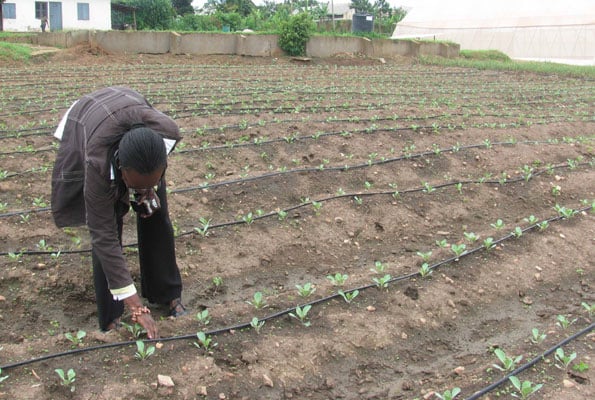12,000 farmers to benefit from irrigation project

Such farming practices as drip irrigation will go a long way to mitigate the effects of climate change on agricultural production. PHOTO BY MICHAEL J. SSALI
What you need to know:
- The Danish government will help Ugandan farmers in the development of business plans for the smallholder irrigation.
At least 12,000 small scale farmers across the country are set to benefit from an irrigation project funded by the Danish government in partnership with Ugandan sector players.
The project dubbed ‘Enhancing irrigation to improve climate adaptation and sustain smallholder production systems in Uganda,’ which was launched in Kampala yesterday, is expected to train smallholder farmers on using irrigation technology to ensure food production all year round.
Mr John McNay, the East African adviser for Access to Innovations, a Danish organisation operating in East Africa, said his government has earmarked at least $1.5m (about Shs5.5 billion) for the project.
He explained that it is to ensure that Ugandan farmers adopt quality climate-smart irrigation technologies given the current effects of climate change.
“The reality is that many farmers in Uganda are experiencing increasing crop failure due to changes in climate. Therefore, irrigation is going to be a key factor moving forward, not just for the high-value crops, but also lower value crops,” Mr McNay said.
Mr Gerald Masila, the executive director of the East African Grain Council (EAGC), one of the project implementers, said the project will focus on building the capacity of smallholder farmers to embrace a spectrum of climate adaptation practices to drive demand for irrigation technology.
“So this project will look at providing water either from rivers or from dams or from lakes to supplement when there is erratic or inadequate rainfall and mainly for production of high value crops such as cereals and also horticulture mainly for the market that would be able to reward sufficiently to be able to meet the additional costs of irrigation,” he said.
“This will ensure that those farmers who will have acquired this technology, and through loans and other financing, they will be able to raise sufficient revenues that will be able to pay back the loans while they are also making better income,” he added.
Many previous irrigation investments have significantly underperformed but Mr Masila said this irrigation project is unique as it offers the off-taker arrangement, where farmers use the irrigation equipment and make payments after production.
“We’re developing a business plan that considers the equipment acquisition cost, the projected yield, and a pre-identified off-taker with an established price. This way, the technology’s cost is factored in based on the expected income from the produce,” he said.
Mr McNay said the Danish government will help Ugandan farmers in the development of business plans for the smallholder irrigation.
“We will also support them with developing the value chains, so that not only can they produce better crops under irrigation, but also find market for those crops in the Scandinavian markets,” Mr McNay said.
About project
The three-year project will be implemented by Eastern Africa Grain Council (Uganda), Grundfos (Denmark), Akvo International (Uganda), and Access to Innovation (Denmark) with support from the Denmark Ministry of Foreign Affairs (MFA).




